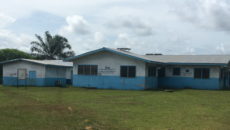PAYNESVILLE, Montserrado – The Ministry of Health has launched the third phase of a campaign to distribute mosquito nets treated with insecticides.
At the June 15 launch in Paynesville, Health Minister Wilhelmina Jallah said Liberia is targeting a 75 percent reduction in malaria. The 2.7 million nets expected to be distributed nationwide would be an important tool in fighting the disease.
“The 2.7 million, we know that every household will have a few nets to make sure that the families are protected,” she said. “I want to urge everyone to use these nets for the intended purpose.”
The health minister thanked partners such as the United States government and Plan International for supporting the campaign.
In response, U.S. Ambassador Michael McCarthy said Liberia could reduce the burden of malaria by mobilizing the private sector and domestic resources towards malaria control.
He said other countries in Africa are moving towards malaria elimination, and Liberia can do the same.
“Well over a million malaria cases are confirmed in Liberia every year -making the disease the leading cause of morbidity and mortality for Liberians,” McCarthy said. “At health facilities, malaria accounts for a third (34 percent) of outpatient attendance and a third (34 percent) of deaths among children under the age of five.”
McCarthy noted that enhanced efficiency in the health sector and increased access to health services are keys to successfully tackling the spread of malaria.
“Ending malaria would generate positive results across the board: increased school attendance, enhanced worker productivity, and significantly reduced costs for treatment and drugs,” he said.
The U.S. ambassador reinforced his government’s commitment to working with Liberia to free its citizens from the burden of malaria.
“We have seen the progress made in delivering quality health services to Liberia’s citizens,” he said. “I am convinced that with the sustained focus of a Liberian-led effort fully supported by the Government of Liberia, malaria will one day cease to be a common threat to all Liberians.”
Also speaking at the program was Plan International’s country director, Miriam Murray, who touted the proper use of insecticide-treated nets as “one of the effective ways of preventing malaria.”
The World Health Organization estimates that 2,200 persons die from malaria every year in Liberia. There is no vaccine yet approved to prevent malaria. However, in April this year, preliminary results of a vaccine trial tested in 450 children aged 5–17 months showed that the vaccine was up to 77 percent effective at preventing malaria over the course of one year. More extensive trials are required before the vaccine can be approved and adopted widely by countries like Liberia.
Featured photo by Sampson David



